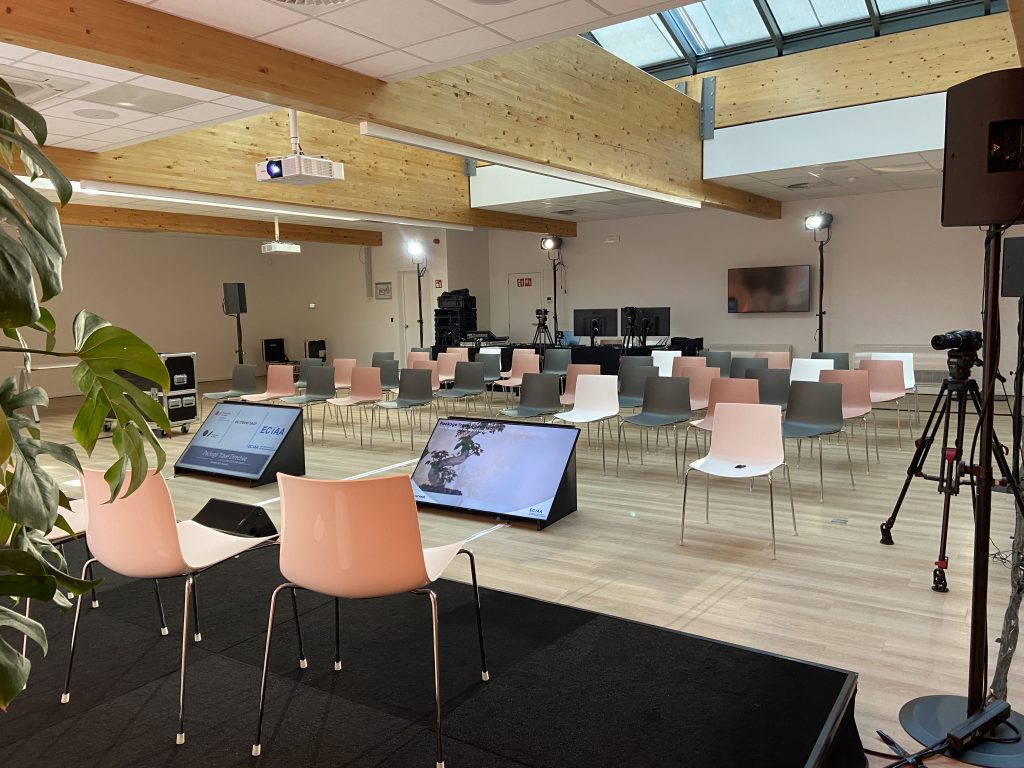Event planning is a strategic opportunity to strengthen professional relationships, enhance brand visibility, and foster collaboration within a company. Whether it’s a conference, seminar, networking event, or team-building retreat, a well-organized corporate gathering can leave a lasting impact on attendees and contribute to business growth. However, organizing a successful event involves multiple challenges, from setting clear objectives and managing logistics to ensuring high engagement and measuring success. Without a structured approach, companies risk exceeding budgets, failing to meet expectations, or missing key opportunities for meaningful interactions.
To navigate these complexities, many businesses turn to experienced event professionals. Companies like ACE Events offer tailored solutions that streamline the process, ensuring each event is seamlessly executed and aligned with strategic goals. From selecting the right venue to coordinating audiovisual setups and catering, every detail plays a crucial role in creating an unforgettable experience.
This guide outlines a step-by-step framework for effective event planning, providing practical insights to help businesses design, execute, and optimize their corporate events. By following these key principles, organizations can ensure their events drive engagement, foster collaboration, and deliver long-term value.

Step 1: Define the Event Objectives
A successful event planning process starts with a clear and well-defined objective. Without a specific goal, it becomes difficult to make strategic decisions, allocate resources effectively, and measure the success of the event.
Key Questions to Define Your Objectives
Before diving into logistics, it’s essential to clarify the purpose and expectations of the event. Ask yourself:
- What is the primary goal of the event?
- Examples: fostering team spirit, strengthening client relationships, launching a new product, training employees, or building brand awareness.
- Who is the target audience?
- Employees, partners, clients, investors, or industry professionals?
- What does success look like?
- KPIs may include attendance rate, audience engagement, social media reach, press coverage, lead generation, or revenue impact.
Establishing clear objectives ensures that every element of the event contributes to achieving meaningful results.
Aligning Objectives with the Type of Event
Different corporate events serve different business needs. Here’s how objectives may align with event types:
- Networking Events → Encourage professional connections and partnerships.
- Product Launches → Generate awareness, media buzz, and industry credibility.
- Training Seminars → Improve employee skills and professional development.
- Corporate Retreats → Strengthen team collaboration and company culture.
- Conferences & Summits → Share insights, establish authority, and showcase innovations.
Clearly defining your objectives from the start helps in structuring an impactful and well-organized event. When organizing a corporate event, it’s essential to follow a structured approach to ensure its success. For a detailed guide to corporate event management, take a look at this comprehensive guide to corporate event planning, which explores every step from defining objectives to flawless event execution.
Step 2: Set the Budget and Allocate Resources
A well-planned budget is essential for successful event planning. It ensures that resources are allocated efficiently, prevents overspending, and helps prioritize expenses without compromising quality.
Key Budget Categories to Consider
When planning a corporate event, the budget should cover multiple essential areas:
- Venue Costs → Rental fees, deposits, setup charges.
- Catering & Refreshments → Meals, snacks, drinks, and dietary accommodations.
- Audiovisual & Technical Setup → Projectors, microphones, lighting, live streaming.
- Marketing & Promotion → Event website, social media ads, email campaigns.
- Speakers & Entertainment → Guest speakers, panelists, performers, or interactive experiences.
- Logistics & Staff → Security, event coordinators, transportation, accommodations.
Understanding these categories helps prevent unexpected costs and ensures that no critical aspect is overlooked.
Optimizing Costs and Managing Contingencies
To ensure budget efficiency and flexibility:
- Compare multiple vendor quotes to secure the best deals.
- Negotiate bundled services (venue + catering + AV) for cost savings.
- Seek sponsorships or partnerships to offset expenses.
- Allocate 10-15% of the budget as a contingency fund for unexpected costs.
Budgeting wisely allows for a seamless event without last-minute financial stress.

Step 3: Choose the Perfect Venue
The event venue is one of the most crucial decisions in event planning, as it impacts the overall experience, logistics, and attendance. A well-chosen venue aligns with the event’s goals, accommodates all attendees comfortably, and provides the necessary facilities.
Key Factors to Consider When Selecting a Venue
Before booking a venue, consider the following essential aspects:
- Location & Accessibility → Ensure the venue is easy to reach, close to public transportation, and has parking facilities.
- Capacity & Layout → The venue should accommodate your audience comfortably and support different seating configurations.
- Technical Infrastructure → Check for high-speed Wi-Fi, audiovisual equipment, soundproofing, and live-streaming capabilities.
- Ambience & Branding → The venue should align with the company’s image and event theme.
- Catering & On-Site Facilities → Ensure the venue offers catering options (see our parners page)
A well-selected venue enhances attendee experience and streamlines event logistics.
Best Venue Options for Corporate Events
Different types of events require different types of venues. Here are some top choices:
- Conference Centers → Ideal for large-scale business meetings, summits, and industry conferences.
- Meeting Rooms → Great for professional meetings, ad-hoc events, and medium-size gatherings.
- Hotels & Business Hubs → Perfect for executive meetings, training sessions, and networking events.
- Coworking Spaces → Flexible, modern spaces suited for workshops, brainstorming sessions, and team-building activities.
- Luxury Event Spaces → Suitable for high-end networking events, corporate celebrations, and product launches.
Choosing the right venue ensures a smooth planning process and a positive attendee experience.
Step 4: Plan the Event Program & Schedule
A well-structured event program keeps attendees engaged, ensures smooth transitions between sessions, and maximizes the impact of the event. Proper scheduling prevents logistical issues and allows for a seamless experience.
Key Elements of a Strong Event Schedule
When creating an event timeline, consider these essential elements:
- Opening Session & Welcome Speech → Set the tone and introduce the event objectives.
- Keynote Speakers & Presentations → Engage the audience with industry insights, expert talks, or company updates.
- Breakout Sessions & Workshops → Offer interactive, small-group discussions tailored to attendee interests.
- Networking Breaks → Allow time for participants to connect, exchange ideas, and build relationships.
- Panel Discussions & Q&A Sessions → Provide an opportunity for thought leaders to discuss key industry topics.
- Closing Remarks & Call to Action → End on a strong note by summarizing key takeaways and encouraging post-event engagement.
A clear schedule ensures that all sessions run smoothly and meet audience expectations.

Best Practices for an Engaging Event Flow
To keep participants engaged throughout the event, follow these best practices:
- Balance content and interaction → Alternate between presentations, discussions, and networking.
- Ensure proper timing → Avoid overly long sessions by keeping presentations concise and impactful.
- Provide flexibility → Allow attendees to choose from parallel sessions or networking opportunities.
- Use digital tools → Share the schedule via an event app or website to ensure easy access.
A well-planned event schedule enhances the overall event experience and keeps attendees actively involved.

Step 6: Coordinate Event Logistics & Operations
Flawless event logistics ensure a smooth experience for both organizers and attendees. From setting up the venue to managing technical requirements, every detail must be carefully planned to prevent disruptions and enhance event quality.
Key Logistical Aspects to Manage
To execute a seamless event, focus on the following essential logistics:
- Venue Setup & Layout → Ensure that seating arrangements, stage positioning, and breakout areas align with the event’s objectives. Depending on the event type, you may need a theater-style setup for keynote sessions, round tables for discussions, or open networking spaces.
- Catering & Refreshments → If offering meals or coffee breaks, confirm menu selection, dietary options, and the catering service’s schedule. Food should be easily accessible without disrupting event flow.
- Audiovisual & Technology → Test microphones, projectors, screens, and live streaming equipment before the event begins. Having a dedicated AV technician on-site can help troubleshoot any issues.
- Security & Health Measures → Ensure proper crowd control, access management, and emergency protocols. If required, have medical personnel or first-aid stations available.
- Signage & Directions → Use clear signage throughout the venue to guide attendees towards registration desks, restrooms, breakout rooms, and exits.
Effective coordination of these elements contributes to a well-organized event where guests feel comfortable and engaged.

How to Handle On-Site Operations Efficiently
Managing real-time event operations requires a structured approach to handle any unexpected challenges:
- Create a Run-of-Show Document → Outline key timings, responsibilities, and contingencies for each segment of the event. Share it with the organizing team and vendors.
- Assign Clear Roles to Staff & Volunteers → Each team member should have a specific responsibility, whether it’s guest registration, stage management, tech support, or attendee assistance.
- Conduct a Final Walkthrough Before the Event Starts → Double-check the venue setup, test the equipment, and confirm last-minute details with vendors.
- Have a Troubleshooting Plan → Be prepared for potential issues such as power outages, Wi-Fi failures, or speaker delays. Keeping backup supplies and a flexible mindset helps minimize disruptions.
- Ensure Real-Time Communication Among Staff → Use walkie-talkies, messaging apps, or an event management platform to stay connected and address urgent issues immediately.
Successful event logistics and operations guarantee a professional and seamless experience, allowing attendees to focus on the content and connections rather than logistical hiccups.

Step 7: Engage Attendees Before & During the Event
A well-planned engagement strategy keeps attendees excited before the event and actively involved throughout its duration. Encouraging participation improves the overall experience and ensures attendees leave with valuable takeaways.
How to Build Excitement Before the Event
Creating anticipation before the event is crucial for maximizing attendance and fostering early engagement. Here’s how to do it:
- Leverage Email Marketing & Social Media → Send countdown emails with event highlights, teaser content, and reminders. Use LinkedIn, Twitter, and Instagram to share behind-the-scenes preparations, introduce speakers, or create interactive polls.
- Offer Early Access or Exclusive Perks → Provide registered attendees with early access to networking groups, pre-event content (such as speaker interviews or whitepapers), or priority seating options.
- Use Branded Hashtags & Community Engagement → Encourage attendees to use a custom event hashtag on social media and create a LinkedIn or Facebook group to connect participants before the event.
- Personalize the Experience → Allow attendees to choose their preferred sessions in advance, submit questions for speakers, or suggest discussion topics.
- Send Event Reminders with Practical Information → Provide essential details like venue address, parking options, agenda highlights, and event app login instructions to avoid last-minute confusion.
A strong pre-event engagement strategy increases excitement and ensures higher attendance rates.
Best Practices for Audience Engagement During the Event
Once the event begins, keeping attendees engaged is essential for a dynamic and memorable experience. Consider these strategies:
- Interactive Q&A Sessions → Use live polling or audience Q&A tools (like Slido) to encourage participation and make discussions more engaging.
- Gamification & Challenges → Introduce activities like live quizzes, scavenger hunts, or reward-based challenges to boost interaction and networking.
- Facilitated Networking Breaks → Organize structured networking sessions where attendees can meet relevant contacts based on their interests or industries.
- Live Social Media Interaction → Encourage real-time posting with an event hashtag, set up a social media wall displaying live tweets, and interact with online audiences via live streams.
- On-Site Surveys & Feedback Forms → Ask attendees to provide instant feedback through mobile apps or quick digital surveys to gauge their experience and make on-the-spot improvements.
When attendees feel actively involved, they are more likely to have a positive experience, retain key insights, and continue engaging with your company beyond the event.
Step 8: Post-Event Follow-Up & Measuring Success
The work doesn’t stop once the event is over. A strong post-event follow-up strategy helps maintain connections with attendees, gather valuable feedback, and assess whether the event met its objectives. Proper event performance analysis ensures continuous improvement for future events.
How to Effectively Follow Up with Attendees
Maintaining engagement after the event strengthens relationships and increases the chances of future collaboration. Here’s how to follow up effectively:
- Send a Personalized Thank-You Email → Express appreciation to attendees, speakers, and sponsors. Include a recap of key takeaways, highlights, and a call to action (e.g., join a follow-up webinar, schedule a consultation).
- Share Event Content & Recordings → Provide access to presentation slides, session recordings, or summary articles for those who want to revisit insights. This adds value and extends the event’s impact.
- Gather Feedback Through Surveys → Send a post-event survey asking attendees to rate their experience, share suggestions for improvement, and highlight what they found most valuable. Use tools like Google Forms or Typeform for easy data collection.
- Engage on Social Media → Post event photos, testimonials, and key highlights. Encourage attendees to share their experiences and tag your company.
- Follow Up with Leads & Potential Clients → If the event aimed at generating business opportunities, nurture leads through targeted email campaigns, personalized outreach, or scheduled follow-up meetings.
A strong post-event strategy keeps the momentum going and fosters long-term engagement.
Measuring Success: Key Event Performance Metrics
Analyzing event success is crucial for understanding what worked well and what can be improved. Track these essential Key Performance Indicators (KPIs):
- Attendance & Registration Metrics
- Number of attendees vs. registrations
- No-show rate
- Engagement level during the event (participation in Q&As, networking)
- Audience Feedback & Satisfaction
- Survey responses & ratings
- Common feedback themes (positive aspects & areas for improvement)
- Business & ROI Metrics
- Leads generated or deals closed
- Social media engagement & brand mentions
- Press coverage and media exposure
- Operational & Logistics Analysis
- Effectiveness of venue setup & catering
- Technical performance (AV, streaming)
- Budget adherence & cost-effectiveness
Reviewing these performance indicators allows organizers to fine-tune future event planning strategies and continuously improve the attendee experience.

Your corporate event checklist and planning essentials
Organizing a successful business gathering requires more than just a venue and a few speakers—it demands structure, foresight, and a clear roadmap. That’s where a corporate event checklist becomes indispensable. From initial brainstorming to post-event analysis, having a structured list of tasks ensures that nothing is overlooked and that every aspect of the event aligns with your strategic goals.
Essential items on your corporate event checklist include:
-
Defining the event’s core objectives and KPIs
-
Setting and allocating your corporate event budget
-
Selecting the right venue and suppliers
-
Planning your program and activities
-
Coordinating logistics, catering, and AV setup
-
Promoting the event and managing guest communications
-
Preparing contingency plans
-
Collecting feedback and evaluating performance
Using a detailed checklist not only streamlines the process but also allows teams to delegate responsibilities more effectively. It ensures consistency across all corporate events, regardless of their size or complexity.
A practical event planning guide for businesses
This article is designed to serve as a practical and strategic event planning guide for professionals seeking to elevate their corporate gatherings. By covering everything from budget creation and venue selection to attendee engagement and post-event follow-up, it provides a clear framework to follow.
Whether you’re a seasoned event manager or planning your first company seminar, having a reliable guide in hand can dramatically improve your outcomes. It ensures that every event you organize becomes an opportunity to reinforce your brand, build stronger relationships, and achieve measurable business results.

Final Thoughts: Mastering Event Planning for Business Growth
A well-executed corporate event strengthens brand visibility, fosters meaningful connections, and delivers measurable business results. By following this step-by-step event planning guide, companies can optimize logistics, engage attendees, and maximize the event’s impact.
Continuous post-event evaluation ensures ongoing improvement, making each corporate gathering more effective than the last.
Ready to plan your next corporate event in Brussels?
Whether you’re organizing a high-level conference, a team-building retreat, or a product launch, ACE Events is here to help you bring your vision to life. Based in Brussels, our expert team offers tailored support—from venue selection and room setup to audiovisual coordination and guest management—ensuring every detail is flawlessly executed.
👉 Contact ACE Events today to start planning an unforgettable corporate gathering in Brussels.

